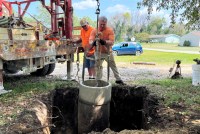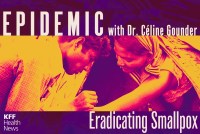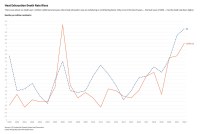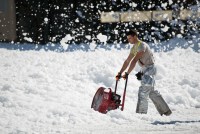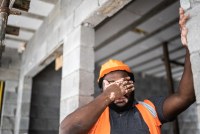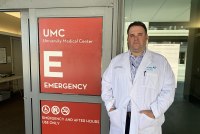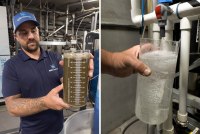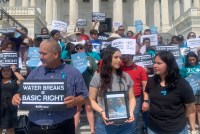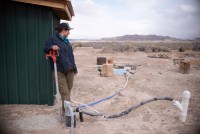Latest KFF Health News Stories
US Military Says National Security Depends on ‘Forever Chemicals’
PFAS chemicals are found in hundreds of products and weapons used by the U.S. military. Defense Department officials say a blanket ban on these man-made substances would threaten military readiness.
Millions of Rural Americans Rely on Private Wells. Few Regularly Test Their Water.
More than 43 million Americans drink, bathe, and cook with water from private wells, which can be tainted by farm or industrial runoff, leaky septic systems, or naturally occurring minerals.
Epidemic: What Good Is a Vaccine When There Is No Rice?
What good is a vaccine when there is no rice? Episode 7 of “Eradicating Smallpox” explores the barriers public health workers face in communities where people’s basic needs aren’t being met.
Rare ‘Flesh-Eating’ Bacterium Spreads North as Oceans Warm
A rise in cases of Vibrio vulnificus and its spread northward have heightened concern about the bacterium, which can cause human tissue to rot and skin to decay. The Centers for Disease Control and Prevention is trying to make more doctors aware of the dangerous pathogen.
Heat-Related Deaths Are Up, and Not Just Because It’s Getting Hotter
Excessive heat contributed to 1,670 deaths nationwide last year, according to federal data — the highest rate in at least two decades. An increase in drug use and homelessness, along with hotter temperatures, were among the reasons.
‘Like a Russian Roulette’: US Military Firefighters Grapple With Unknowns of PFAS Exposure
Federal research linking “forever chemicals” to testicular cancer confirms what U.S. military personnel long suspected. But as they seek testing for PFAS exposure, many wonder what to do with the results. There’s no medical treatment yet.
No existen normas federales para proteger a los trabajadores cuando los días son excesivamente calurosos. Y sin el apoyo bipartidista del Congreso, incluso con la atención urgente de la administración Biden, es posible que el alivio no llegue en años.
Workers Pay the Price While Congress and Employers Debate Need for Heat Regulations
Studies suggest official numbers vastly underestimate heat-related injuries and illness on the job. To institute protections, the government must calculate their cost — and the cost of inaction.
How Far Will Montana’s Push to Remove Lead from School Drinking Water Go?
Montana has earmarked $3.7 million to address widespread high levels of lead in school drinking water. But it likely isn’t enough to solve the problem.
More Cities Address ‘Shade Deserts’ as Extreme Heat Triggers Health Issues
Where trees are growing — and who has access to their shade — affects health and well-being, especially in one of the hottest states in the country.
Journalists Track Hospitals’ Delivery of Charity Care and the Menace of ‘Forever Chemicals’
KFF Health News and California Healthline staff made the rounds on national and local media this week to discuss their stories. Here’s a collection of their appearances.
Pioneering Study Links Testicular Cancer Among Military Personnel to ‘Forever Chemicals’
The military first documented health concerns surrounding chemicals known as PFAS decades ago yet has continued to use firefighting foam made with them. Despite scores of lawsuits by its personnel and high rates of testicular cancer among troops, it has been slow to investigate a connection.
As Many American Cities Get Hotter, Health Systems Face Off Against Heatstroke
With millions of Americans suffering under relentless heat waves this summer, more people are seeking medical attention for heat-related illnesses. As temperatures get more extreme, hospitals, fire departments, and ambulance crews are preparing to treat more patients for heat exhaustion and heatstroke.
As Water Reuse Expands, Proponents Battle the ‘Yuck’ Factor
As drought and climate change threaten water supplies, municipalities around the country are ramping up water reuse efforts. But they have to overcome the “yuk” factor.
Texan Activists Thirst for a National Heat Standard to Protect Outdoor Workers
As much of the U.S. faces extremely high summer temperatures, Texas’ Republican governor, Greg Abbott, has taken steps that effectively eliminate mandated water breaks for construction workers. In response, protesters from the Lone Star State came to Washington, D.C., to press for federal protections for such outdoor workers.
KFF Health News' 'What the Health?': Let’s Talk About the Weather
It’s been the summer of broken weather records around the world — for heat, rain, and wildfire smoke — advertising the risks of climate change in a big way. But, apparently, it’s not enough to break the logjam in Washington over how to address the growing climate crisis. Meanwhile, in Texas, women who were unable to get care for pregnancy complications took their stories to court, and Congress gears up to — maybe — do something about prescription drug prices. Alice Miranda Ollstein of Politico, Shefali Luthra of The 19th, and Rachel Cohrs of Stat join Julie Rovner, KFF Health News’ chief Washington correspondent, to discuss these issues and more. Also this week, Rovner interviews Meena Seshamani, the top administrator for the federal Medicare program.
Proposed PFAS Rule Would Cost Companies Estimated $1B; Lacks Limits and Cleanup Requirement
A proposed Environmental Protection Agency rule calls for companies to disclose PFAS manufactured or imported since 2011. The chemical industry is upset because such compliance would cost an estimated $1 billion, while environmental health advocates worry because the rule wouldn’t ban the chemicals outright.
Journalists Cover Air Quality, Tick Risks, and … Brazilian Butt Lifts?
KFF Health News and California Healthline staff made the rounds on national and local media this week to discuss their stories. Here’s a collection of their appearances.
California Schools Start Hatching Heat Plans as the Planet Warms
State researchers offer recommendations on how schools can become more heat-resilient in the face of global warming. Proposed changes to state law could make it easier to build shade structures.
As Water Levels Drop, the Risk of Arsenic Rises
As the West grapples with a megadrought, its driest spell in at least 1,200 years, rising levels of arsenic — a known carcinogen — in Colorado’s San Luis Valley offer clues to what the future may hold.




